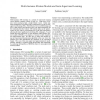Free Online Productivity Tools
i2Speak
i2Symbol
i2OCR
iTex2Img
iWeb2Print
iWeb2Shot
i2Type
iPdf2Split
iPdf2Merge
i2Bopomofo
i2Arabic
i2Style
i2Image
i2PDF
iLatex2Rtf
Sci2ools
153
Voted
SDM
2011
SIAM
2011
SIAM
Multi-Instance Mixture Models
Multi-instance (MI) learning is a variant of supervised learning where labeled examples consist of bags (i.e. multi-sets) of feature vectors instead of just a single feature vector. Under standard assumptions, MI learning can be understood as a type of semisupervised learning (SSL). The difference between MI learning and SSL is that positive bag labels provide weak label information for the instances that they contain. MI learning tasks can be approximated as SSL tasks by disregarding this weak label information, allowing the direct application of existing SSL techniques. To give insight into this connection we first introduce multi-instance mixture models (MIMMs), an adaption of mixture model classifiers for multi-instance data. We show how to learn such models using an Expectation-Maximization algorithm in the case where the instance-level class distributions are members of an exponential family. The cost of the semi-supervised approximation to multiinstance learning is explored, ...
Related Content
| Added | 17 Sep 2011 |
| Updated | 17 Sep 2011 |
| Type | Journal |
| Year | 2011 |
| Where | SDM |
| Authors | James R. Foulds, Padhraic Smyth |
Comments (0)

